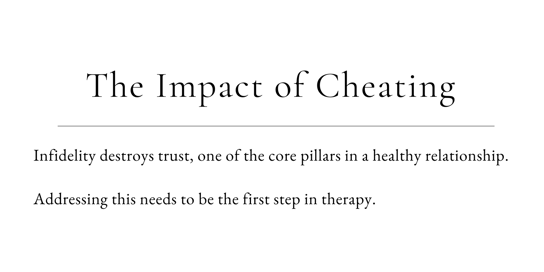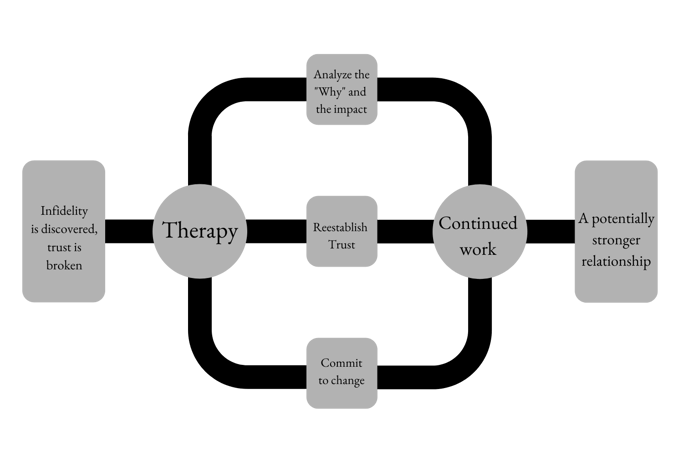How to Express Romantic Love: Effective and Heartfelt Gestures
All the world celebrates romantic love, and people from all walks of life look for ordinary moments and extraordinary ones to express love to their...
5 min read
![]() Williamsburg Therapy Group
:
Feb 16, 2023 1:51:13 PM
Williamsburg Therapy Group
:
Feb 16, 2023 1:51:13 PM
.jpg)
Key Takeaways
Infidelity is one of the most damaging and serious problems a relationship can have. Whether you've been dating for 3 months or you have been married for 30 years, cheating has a lasting impact not only on the relationship itself but also on the individuals in the relationship.
This extends both to the person who was cheated on as well as the cheater themselves. It can also have an impact on any children you have together, as well as on friends or family members that look up to your relationship.
When someone cheats, they're usually only thinking of themselves, but the decision to cheat has drastic impacts on their loved ones as well.
If you or your partner has cheated, understand that, while it's a serious issue, all hope is not lost. Couples counseling may be able to help you discover underlying issues in the relationship, reestablish trust and safety, and make the commitments necessary to save the relationship.
Let's dive into how infidelity counseling can help your relationship after a physical or emotional affair and how it may be able to help you rebuild the relationship better than ever.
Infidelity Counseling Resources on This Page:
How Cheating Affects a Relationship Psychologically
How Does Infidelity Counseling Work?
Can Infidelity Therapy Really Help Us?
Infidelity Counseling in Austin: Williamsburg Therapy Group
The impact that infidelity has on a relationship depends on several factors, including:
A purely monogamous marriage where exclusivity is well-defined and expected in its entirety will need a different therapeutic process than, say, a polyamorous relationship in which one partner crosses an emotional line with one of the other partners.
Your couples or family therapist will be able to tailor their analysis, as well as your process, to your specific situation.
To generalize, however, the impact of cheating can be defined within three parameters:

When someone gets cheated on, the entire mental framework that defines how they perceive the relationship is shattered.
Trust is usually obliterated upon the discovery of the affair. It's understandable—everything they thought they knew about their partner and their behavior is being questioned—but the disappearance of trust also makes it very difficult for the healing process to begin.
Building that trust back is not a simple process. It will require time and help, and a lot of change on the part of the cheater as well as for the relationship.
Beyond trust, their perception of their partner—their values and who they are on the deepest level—goes through the crucible as well.
The person they chose to be their companion, confidant, partner, and lover may not be who they thought they were, and that can be a terrifying experience.
Cheating affects the partner's plans for the future because everything they thought they knew about the relationship is up in the air.
Do they really want to, for example, marry someone who has broken their trust so severely? What about starting a family? All of these questions have to be answered before the relationship can continue. And before they can be answered, trust and respect have to be rebuilt.
A cheating partner's mental health during the affair, as well as after its discovery, is usually characterized by guilt, but it can also be characterized by anger or indifference, depending on the specific situation.
A cheater can lose trust in themselves or have their own self-perception warped or questioned.
There are long-lasting psychological effects of violating a committed relationship, which should also be addressed in therapy.
Despite the seemingly permanent effects of cheating, therapy can actually be very effective in restoring the relationship and even building it back up to be stronger. The process isn't easy, but with the right mental health professional, it's possible.
The specific steps and processes you'll encounter during your infidelity counseling journey will vary depending on your therapist, situation, and relationship. In general, however, you can expect five steps to recovering the relationship.
Note that there is no guarantee the relationship can be salvaged. For some people, cheating is a deal-breaker through and through. It's important to respect the process and allow your therapist to do what they do best: get to the root of the problem.
The first step in infidelity therapy is to prepare for the hard conversations and commit to trusting your therapist.
Chances are that emotions will be running high during the early stages of the process, and it's easy to become defensive or assume you know best.
That's why it's so important to trust your therapist. They have the experience and know-how to make sure the process is as safe and effective as possible.
Your therapist will work with you to find the root cause of the affair.
People may cheat for a number of reasons. While none of them excuse the behavior, they can help provide context and background information for deep concerns in the relationship. Unveiling these concerns is the first step toward progress.
Some foundational reasons for an affair may include:
Your therapist will work with you to find reasons for the affair and help you address them in the context of mental health.
Whether a physical or emotional affair, cheating leads to intense emotions, long-lasting trust issues, and an overall interruption in the rhythm of the relationship.
Finding exactly what has been damaged and how is an important part of determining if the relationship can be salvaged and, if it can, what steps need to be taken.
After understanding what caused the affair as well as its impact, your therapist will work with you to reestablish the bond that defined the relationship before the affair.
They'll also do everything they can during this step to build the relationship back stronger than it was.
When an affair occurs, there is often an underlying communicative or romantic failure in the relationship. Therapy may be able to discover the exact nature of this failure and improve it while reestablishing trust between partners.
One of the most important parts of infidelity counseling is committing to a change in behavior. This stage will likely call on all partners to make changes. For the person who was unfaithful, part of this will obviously be a commitment not to cheat anymore. But it can also include things like:
Your therapist will provide actionable steps you can take to make these changes part of your daily life and keep the relationship healthy even after therapy.

Answering this question requires a discussion with your partner or partners. Affair recovery can be a difficult process—one that many people find intimidating or even perceive as a waste of time.
If you and your partner feel like you want to save the relationship and are ready to commit to the process, you may want to consider attending infidelity counseling.
The couples therapists at Williamsburg Therapy Group's Austin office are highly-trained, doctoral-level psychologists who specialize in analyzing and improving relationships.
Schedule an appointment to try infidelity counseling today, or get in touch with our patient coordinator to get matched with the best therapist for you.
Affairs happen in many relationships. But if it's happened in yours, feeling better may be closer than you think.

All the world celebrates romantic love, and people from all walks of life look for ordinary moments and extraordinary ones to express love to their...

What is relationship burnout or relationship fatigue? Many of us have heard of burnout, but we often connect it to professional life and the problems...

In today's digital age, so many of us are locked into our mobile devices each and every day, which can have a negative impact on our mental...